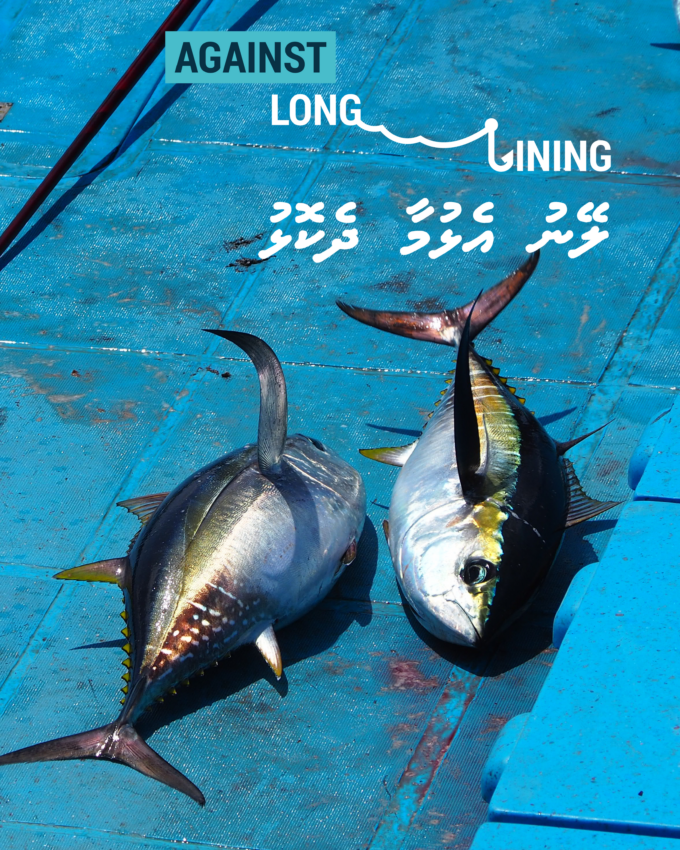LONGLINE FISHING : POTENTIAL IMPACT & CONSIDERATIONS

The Maldives, renowned for its stunning natural beauty, turquoise waters, and vibrant marine life, is also home to a thriving fishing industry that has long been a vital part of the local economy and culture. Recently, there has been discussion around opening up the country’s waters to longline fishing, a commercial fishing method where a central line, often stretching for miles, is equipped with baited hooks to catch a variety of pelagic fish species like tuna. While this method can be lucrative, it also raises significant concerns regarding its impact on the marine ecosystem, local fisheries, tourism, and the economy.
The Potential Impact on the Marine Ecosystem
One of the primary concerns with the introduction of longline fishing in the Maldives is its impact on the delicate marine ecosystem. The Maldives is home to a diverse array of marine life, including several endangered species like sharks, turtles, and seabirds. Longline fishing is notorious for its bycatch—non-target species that are unintentionally caught and often killed in the process. This bycatch can severely disrupt the ecological balance, threatening endangered species and reducing biodiversity.
In addition to bycatch, longline fishing can lead to overfishing of targeted species such as tuna, which are already under pressure from international demand. Overfishing can have a cascading effect on the entire food chain, leading to a decline in predator species and an increase in smaller fish populations, which can alter the composition of the marine ecosystem.
The Impact on Local Fisheries
The Maldives has a long tradition of pole-and-line fishing, a sustainable method that targets tuna and minimizes bycatch. The introduction of longline fishing could pose a direct threat to this traditional practice. As larger commercial vessels begin to exploit the same fish stocks, local fishermen may find themselves competing with these
more efficient but less sustainable methods.
This competition could lead to a decrease in fish populations accessible to local fishermen, reducing their catch and, consequently, their income. The decline in local fisheries could also undermine food security in the Maldives, where fish is a staple of the diet. Furthermore, the loss of traditional fishing practices could erode cultural
heritage and the livelihoods of those dependent on the industry.
Long-Term Effects on Tourism
Tourism is the backbone of the Maldivian economy, with many visitors drawn to the islands for their pristine marine environments and abundant wildlife. The degradation of the marine ecosystem due to longline fishing could have severe consequences for tourism. Coral reefs, which are critical to the health of the marine ecosystem and a
major attraction for tourists, could be damaged by the decline in fish populations and the increase in algae that might result from overfishing.
Additionally, the decline in charismatic megafauna like sharks, turtles, and dolphins—often caught as bycatch—could reduce the appeal of the Maldives as a destination for eco-tourism, diving, and snorkeling. A decrease in tourism could lead to a loss of revenue and jobs, further impacting the Maldivian economy.
Financial Implications
The financial impact of opening the Maldives to longline fishing is multifaceted. In the short term, the government and private enterprises may see an increase in revenue from fishing licenses and the sale of fish on international markets. However, these gains could be offset by the long-term costs associated with environmental degradation, the decline of local fisheries, and the potential downturn in tourism.
The loss of biodiversity and the depletion of fish stocks could lead to the collapse of the fishing industry, necessitating costly interventions to restore the ecosystem. Additionally, if tourism declines, the Maldives could face a significant economic shortfall, given that the sector accounts for a large portion of the country’s GDP. The cost of losing the natural resources that support both the fishing and tourism industries could far outweigh the short-term financial benefits of longline fishing.
The future of longline fishing in the Maldives
While the potential financial gains from opening the Maldives to longline fishing may seem attractive, the long-term risks to the marine ecosystem, local fisheries, tourism, and the economy are significant. The Maldives must carefully consider whether these potential short-term benefits justify the long-term costs. Sustainable practices, conservation efforts, and the protection of traditional fishing methods should be prioritized to ensure the long-term health of the marine environment and the economic stability of the nation.
In conclusion, the introduction of longline fishing in the Maldives requires thorough consideration and a balanced approach that prioritizes environmental sustainability and the well-being of local communities. The future of the Maldives depends not only on the choices made today but on the preservation of its natural resources for
generations to come.
UPDATE SEPTEMBER 2024
Longline fishing for tuna will remain closed in the Maldives, the island country’s president announced on August 29, 2024. The decision came after local fishers, conservation NGOs and scientists protested against plans by the administration of President Mohamed Muizzu to reopen longline fisheries for yellowfin tuna and bigeye tuna. Longline fishing has been banned in the Maldives since 2019.
The President’s decision to keep the ban will ensure the Maldives remains at the forefront of international efforts to safeguard ocean life and secure sustainable fisheries.

